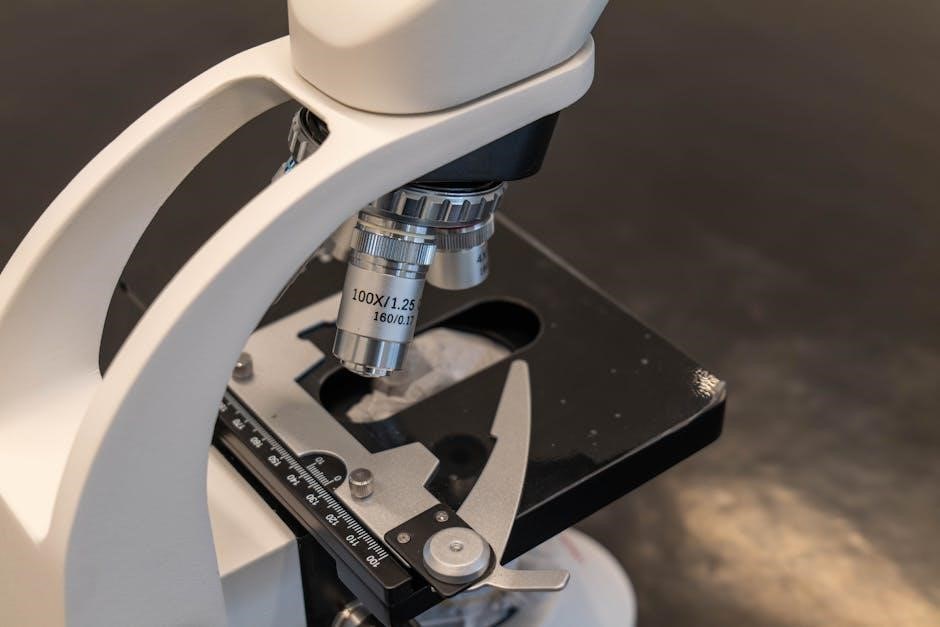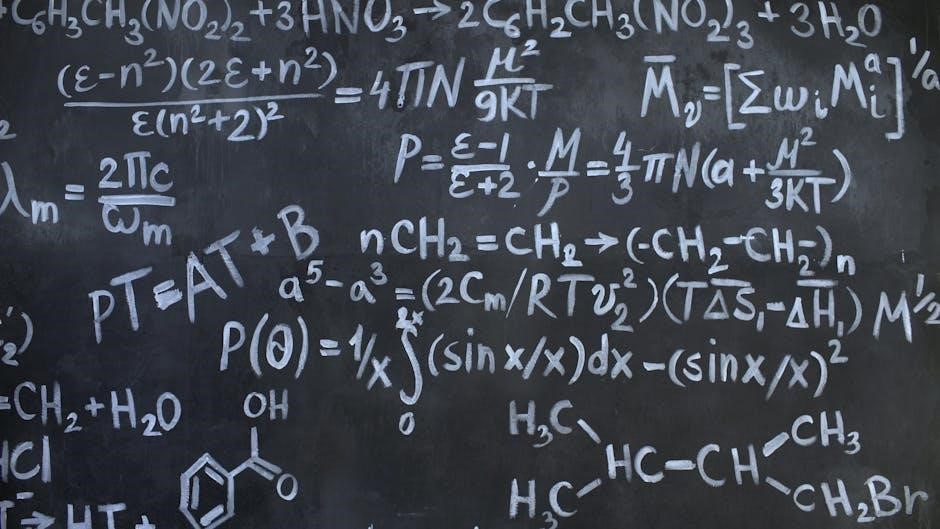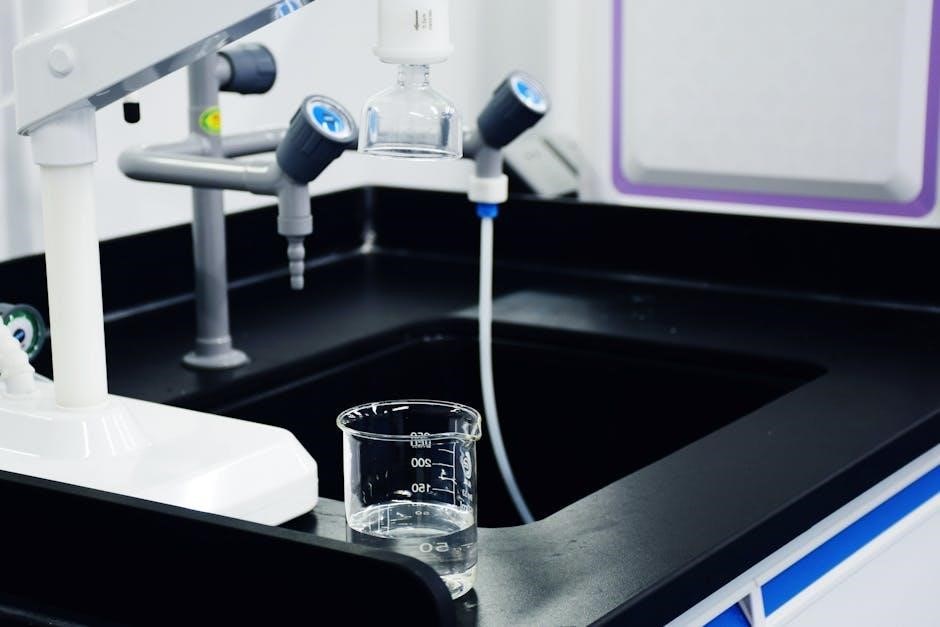The ACS Physical Chemistry Study Guide is a comprehensive resource designed to help students master fundamental concepts and prepare for the ACS Physical Chemistry Exam. It provides structured explanations, worked examples, and practice problems to ensure a thorough understanding of topics like thermodynamics, kinetics, and quantum chemistry, making it an essential tool for exam success.
Scope and Importance of Physical Chemistry

Physical chemistry is a foundational discipline that bridges chemistry and physics, focusing on the study of chemical systems at the molecular and atomic level. It explores the principles governing chemical reactions, thermodynamics, kinetics, and quantum mechanics, providing a deep understanding of how matter behaves and transforms. The scope of physical chemistry is vast, encompassing topics such as energy changes, reaction mechanisms, and the structure of materials. Its importance lies in its ability to explain the underlying principles of chemical processes, making it essential for advancements in fields like materials science, biotechnology, and environmental chemistry. By mastering physical chemistry, students gain the tools to analyze and predict chemical phenomena, enabling them to contribute to cutting-edge research and technological innovations. This discipline is critical for addressing real-world challenges, from developing sustainable energy solutions to understanding biological systems at the molecular level.
Overview of the ACS Physical Chemistry Exam
The ACS Physical Chemistry Exam is a rigorous, 3-hour assessment consisting of 75 multiple-choice questions designed to evaluate a student’s mastery of core physical chemistry concepts. The exam covers a wide range of topics, including thermodynamics, kinetics, quantum mechanics, and advanced theoretical principles. It is structured to test both theoretical understanding and the ability to apply concepts to practical problems. The exam is a critical benchmark for students pursuing advanced studies or careers in chemistry, as it demonstrates their proficiency in analyzing chemical systems and processes. Preparation for this exam requires a deep grasp of fundamental principles and the ability to think critically under time constraints. The ACS Physical Chemistry Study Guide is an invaluable resource, offering practice problems, examples, and strategies to help students navigate the exam effectively and achieve their academic goals.

Understanding the Exam Format
The ACS Physical Chemistry Exam is a 3-hour, 75-question multiple-choice test. It assesses understanding of core concepts, analytical thinking, and problem-solving skills, with questions spanning thermodynamics, kinetics, quantum mechanics, and more.
Structure and Duration of the Exam
The ACS Physical Chemistry Exam is a timed, multiple-choice assessment lasting 3 hours; It consists of 75 questions, each targeting specific areas of physical chemistry. The exam is divided into sections, with questions varying in difficulty to comprehensively evaluate a student’s understanding. The structure ensures a balanced representation of key topics such as thermodynamics, kinetics, and quantum chemistry. Students are allowed to use a periodic table provided by the exam administrators but no other materials. The time limit is strictly enforced to simulate real-world testing conditions. Proper time management is crucial, as each question requires careful analysis and calculation. The exam’s duration and structure are designed to assess both theoretical knowledge and practical application skills, ensuring that successful candidates are well-prepared for advanced studies or professional roles in physical chemistry;
Question Types and Weightage
The ACS Physical Chemistry Exam features 75 multiple-choice questions, each designed to test a student’s understanding of core concepts. The questions are divided into four main content areas: thermodynamics, dynamics (kinetics), quantum chemistry, and comprehensive topics. Thermodynamics and quantum chemistry are heavily weighted, each accounting for approximately 25% of the exam, while kinetics and comprehensive topics make up around 20% and 30%, respectively. Question types range from straightforward recall of definitions to complex problem-solving scenarios. Some questions require mathematical calculations, such as determining activation energy or entropy changes, while others focus on conceptual understanding, like interpreting spectroscopic data. The weightage reflects the importance of each topic in the broader field of physical chemistry. Students are advised to allocate their study time according to the weightage to maximize their performance. Understanding the question types and their distribution is key to effective exam preparation.

Key Content Areas in Physical Chemistry
Thermodynamics, dynamics, quantum chemistry, and comprehensive topics form the core of physical chemistry, with each area requiring a deep understanding of theoretical principles and practical applications. These sections are thoroughly covered in the study guide.
Thermodynamics
Thermodynamics is a foundational area of physical chemistry, focusing on the relationships between heat, work, and energy. The study guide provides a detailed exploration of the laws of thermodynamics, including the zeroth, first, and second laws. It emphasizes key concepts such as internal energy, enthalpy, entropy, and Gibbs free energy, which are critical for understanding chemical processes. Students will also learn about phase equilibria, thermodynamic potentials, and the application of thermodynamics in real-world scenarios. Practical examples and solved problems are included to help reinforce these concepts. The guide also covers the mathematical tools necessary for thermodynamic analysis, such as equations of state and thermodynamic identities. By mastering thermodynamics through this guide, students will gain a solid foundation for tackling more advanced topics in physical chemistry and performing well on the ACS exam. The structured approach ensures clarity and depth in understanding this vital area.
Dynamics and Kinetics
Dynamics and kinetics are central to understanding the rates and mechanisms of chemical reactions. The study guide delves into the principles of chemical kinetics, including rate laws, reaction mechanisms, and catalysis. Students learn how to analyze experimental data to determine rate constants and identify reaction orders. The guide also explores advanced topics such as transition state theory and the role of quantum mechanics in reaction dynamics. Practical examples and practice problems are provided to help students master these concepts. Additionally, the guide covers experimental techniques used to study reaction kinetics, such as spectroscopy and chromatography. By focusing on both theoretical and practical aspects, the guide equips students with the tools to solve complex kinetic problems and apply their knowledge to real-world scenarios. This section is essential for building a strong foundation in reaction dynamics and kinetics, which are critical for success on the ACS Physical Chemistry Exam.
Quantum Chemistry
Quantum chemistry explores the application of quantum mechanics to chemical systems, providing a theoretical foundation for understanding molecular structure, bonding, and spectroscopy. The study guide covers key principles such as wave functions, operators, and the Schrödinger equation, emphasizing their relevance to chemical phenomena. Students learn to interpret molecular orbitals, electronic transitions, and vibrational spectra, which are critical for understanding chemical reactivity and properties. The guide also introduces computational methods, such as Hartree-Fock and density functional theory (DFT), used to model molecular behavior. Practical examples and problems help students apply these concepts to predict molecular geometries, energies, and reaction pathways. This section is designed to deepen the understanding of quantum principles and their role in modern chemical research, equipping students with the tools to tackle advanced topics in physical chemistry and excel on the ACS exam. The integration of theory and computation makes this section invaluable for aspiring physical chemists.
Comprehensive Topics in Physical Chemistry
Comprehensive topics in physical chemistry encompass a broad range of advanced subjects that integrate concepts from thermodynamics, kinetics, and quantum mechanics. These topics include molecular spectroscopy, statistical mechanics, and computational chemistry, which are essential for understanding complex chemical systems. The study guide delves into the principles of molecular interactions, phase equilibria, and reaction dynamics, providing a holistic view of how these phenomena govern chemical behavior. It also explores the application of mathematical tools, such as group theory and differential equations, to solve physical chemistry problems. Practical examples and case studies illustrate how these concepts are applied in real-world scenarios, from materials science to biological systems. By mastering these comprehensive topics, students gain the ability to analyze and predict the behavior of molecules and reactions, a critical skill for excelling on the ACS Physical Chemistry Exam and advancing in chemical research. This section bridges theory and application, ensuring a well-rounded understanding of the field.

Study Strategies and Resources
Effective study techniques for physical chemistry include active learning, problem-solving practice, and utilizing recommended textbooks. The guide highlights proven strategies and resources to maximize learning efficiency and achieve exam success.
Effective Study Techniques for Physical Chemistry
Mastering physical chemistry requires a structured and proactive approach. Start by understanding core concepts through active learning, engaging with textbook materials, and attending lectures. Regular problem-solving is crucial, as it reinforces theoretical knowledge. Use the ACS Physical Chemistry Study Guide for practice questions and worked examples to improve your skills. Allocate dedicated time for reviewing and organizing notes, focusing on key topics like thermodynamics, kinetics, and quantum mechanics. Incorporate flashcards for memorizing equations and concepts. Join study groups to discuss challenging topics and gain new insights. Utilize online resources, such as simulation tools and video tutorials, to visualize complex processes. Finally, simulate exam conditions by attempting timed practice exams to enhance time management and reduce anxiety. Consistency and thorough preparation are key to excelling in physical chemistry and the ACS exam.
Recommended Textbooks and Online Resources
To excel in physical chemistry, it is essential to supplement your studies with high-quality resources. The ACS Physical Chemistry Study Guide is a must-have, offering comprehensive coverage of exam topics. Textbooks like “Physical Chemistry” by Atkins and de Paula, and “Chemical Thermodynamics” by Peter Rock, provide in-depth explanations of key concepts. For online learning, platforms like Quizlet offer flashcards and practice questions to reinforce memorization. Khan Academy and 3Blue1Brown provide engaging video tutorials on thermodynamics, kinetics, and quantum mechanics. Additionally, ACS Publications and Journal of Physical Chemistry offer cutting-edge research articles to deepen your understanding. Utilizing these resources ensures a well-rounded preparation for the ACS exam and beyond. By combining these materials with consistent study, you can build a strong foundation in physical chemistry.

Practice and Application
Mastering physical chemistry requires hands-on practice and real-world application. The ACS Study Guide provides sample practice questions and case studies, enabling students to apply theoretical concepts to practical scenarios effectively.
Sample Practice Questions and Solutions
The ACS Physical Chemistry Study Guide includes a wide range of sample practice questions and detailed solutions, covering topics such as thermodynamics, kinetics, and quantum chemistry. These questions are designed to mirror the actual exam format, helping students assess their understanding and identify areas for improvement. The solutions provide clear, step-by-step explanations, allowing learners to grasp complex concepts and problem-solving strategies. Additionally, the guide incorporates real-world applications to contextualize the material, making it easier to relate theoretical knowledge to practical scenarios. By working through these questions, students can build confidence and develop the critical thinking skills necessary for success on the exam. The guide also offers access to additional resources, such as flashcards and interactive tools, to further enhance study efforts. Regular practice with these questions ensures a strong foundation in physical chemistry principles and their applications.
Case Studies and Real-World Applications
The ACS Physical Chemistry Study Guide emphasizes the importance of connecting theoretical concepts to practical scenarios through case studies and real-world applications. These examples illustrate how physical chemistry principles are applied in fields such as materials science, biotechnology, and environmental chemistry. For instance, the guide explores how thermodynamic principles govern chemical reactions in industrial processes and how quantum mechanics informs the design of new materials. Additionally, it highlights the role of kinetics in understanding reaction mechanisms in biological systems and the environment. By incorporating these applied contexts, the guide helps students appreciate the relevance of physical chemistry to everyday challenges. This approach not only deepens understanding but also prepares learners to tackle real-world problems with confidence. The integration of case studies makes the material engaging and demonstrates the broader impact of physical chemistry in advancing scientific and technological solutions. This practical focus is a key feature of the study guide, making it invaluable for aspiring chemists.



